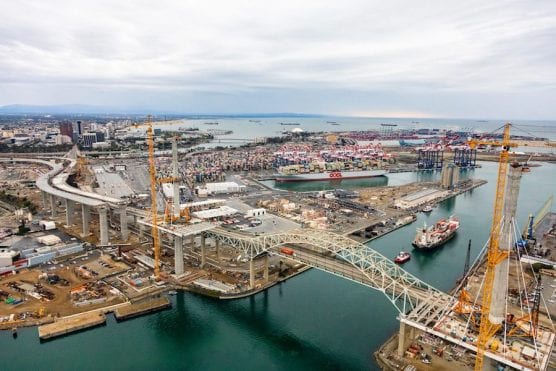LOS ANGELES — The U.S. Environmental Protection Agency (EPA) announced Tuesday enforcement actions involving $530,199 in fines and over 10,000 engines and vehicles imported into the United States. These actions are the result of on-going joint operations between EPA and the U.S. Customs and Border Protection (CBP) at the ports of Los Angeles and Long Beach to identify foreign-made engines and vehicles that lack proper emission controls, including ATVs, motorcycles, and construction equipment.
“Oversight of foreign-made engines imported through southern California ports is a priority,” said EPA Pacific Southwest Regional Administrator Mike Stoker. “The enforcement cases announced (Tuesday) prevented hundreds of thousands of pounds of harmful air pollutants from being emitted into our air. We will continue to look work with CBP to ensure that items coming into the U.S. meet federal emissions requirements.”
Under the joint initiative, EPA found companies imported engines and vehicles without certification or proper emissions controls. Engines operating without adequate controls emit excess carbon monoxide, hydrocarbons, and nitrogen oxides, which can cause respiratory illnesses, aggravate asthma, and lead to the formation of ground level ozone. Particular cases involved the following companies:
Piaggio, located in New York, New York, imported 5,009 motorcycles, including from Vietnam and China, that contained catalysts that did not conform to the description as certified by EPA. The company was required to pay a $240,000 penalty.
Value Group, located in Norwalk, California, imported 108 motorcycles from China that contained catalysts not matching their description as certified by EPA. The company shipped the motorcycles out of the U.S. and was required to pay a $50,000 penalty.
Yamazuki, located in Ontario, California, imported 213 highway motorcycles, off-highway motorcycles and ATVs from China into the ports. The vehicles contained catalysts not matching their description as certified by EPA. The company shipped the vehicles out of the U.S. and was required to pay a $50,000 penalty.
BV Powersports, located in Carrollton, Texas, imported 171 motorcycles from China that contained catalysts not matching their description as certified by EPA. The company shipped the motorcycles out of the U.S. and was required to pay a $13,000 penalty.
BMS Motorsports, located in Riverside, California, imported 13 ATVs from China that contained catalysts not matching their description as certified by EPA. The company shipped the ATVs out of the U.S. and was required to pay a $10,000 penalty.
In addition to the five companies above, EPA found another 19 companies imported 4,882 illegal products from China, including motorcycles, scooters, marine engines, ATVs, generators, engines and jackhammers. The companies paid fines totaling $167,199 and were required to ship the items out of the United States. The companies include:
American Lifan. Case details: www.epa.gov/sites/production/files/2018-08/documents/americanlifaninc18.pdf
Boom international Holdings. Case details: www.epa.gov/sites/production/files/2017-05/documents/boominternationalholdingsusainc17.pdf
Boom international Holdings. Case details: www.epa.gov/sites/production/files/2018-08/documents/boominternationalholdingsusainc18.pdf
Cougar Cycles. Case details: www.epa.gov/sites/production/files/2018-08/documents/cougarcycleinc18.pdf
CFY International. Case details: www.epa.gov/sites/production/files/2018-12/documents/cfyinternationalinc.pdf
CRT Motor. Case details: www.epa.gov/sites/production/files/2019-02/documents/crtmotorinc.pdf
CSC Motorcycles. Case details: www.epa.gov/sites/production/files/2018-08/documents/cscmotorcyclesllc18.pdf
EGL Motor. Case details: www.epa.gov/sites/production/files/2018-08/documents/eglmotorinc18.pdf
Gallop Management. Case details: www.epa.gov/sites/production/files/2018-08/documents/gallopmanagementinc18.pdf
Hisun Motors corporation. Case details: www.epa.gov/sites/production/files/2018-08/documents/hisunmotorscorporationusa18.pdf
International Merchandising Service. Case details: www.epa.gov/sites/production/files/2019-02/documents/internationalmerchandisingserviceinc.pdf
Jass Motorsports. Case details: www.epa.gov/sites/production/files/2019-02/documents/jassmotorsportsinc.pdf
KXD Motor. Case details: www.epa.gov/sites/production/files/2019-02/documents/kxdmotorsllc.pdf
Motor HQ Case details: www.epa.gov/sites/production/files/2019-02/documents/motorhqinc.pdf
Synergy Fulfillment Services. Case details: www.epa.gov/sites/production/files/2018-08/documents/synergyfulfillmentservicesinc18.pdf
Triple J Import. Case details: www.epa.gov/sites/production/files/2019-02/documents/triplejimportinc.pdf
US eLogistics. Case details: www.epa.gov/sites/production/files/2019-02/documents/uselogisticsservicecorp.pdf
Yescom. Case details: www.epa.gov/sites/production/files/2018-08/documents/yescomusainc18.pdf
EPA has been conducting regular inspections with CBP at California ports of entry since 2014, where more than 40 percent of containerized goods come into the U.S. EPA and CBP’s focus has been on engines, vehicles, and pesticides. Mobile sources, such as on-road and off-road vehicles, are one the largest sources of air pollution in California and account for approximately 20% of PM2.5 (fine particulate matter up to 2.5 microns in diameter) and 83% of nitrogen oxide emissions.
The Clean Air Act prohibits the importation or sale of any new engines or vehicles unless they are certified by EPA to meet federal emission standards. An EPA-issued certificate of conformity must cover every vehicle and engine sold in the U.S. To obtain a certificate of conformity, manufacturers or importers must submit an application to EPA that describes the engine or vehicle, including its emission control system. The application must also provide emissions data demonstrating that the engines and vehicles will meet applicable federal emission standards.
For more information about importing vehicles and engines into the United States, please visit: http://epa.gov/otaq/imports/index.htm.
Like this:
Like Loading...
Related





 Tweet This
Tweet This Facebook
Facebook Digg This
Digg This Bookmark
Bookmark Stumble
Stumble RSS
RSS


























REAL NAMES ONLY: All posters must use their real individual or business name. This applies equally to Twitter account holders who use a nickname.
0 Comments
You can be the first one to leave a comment.